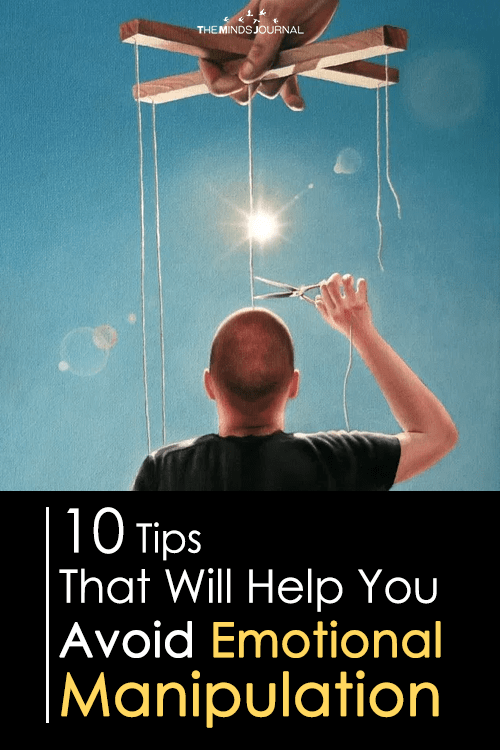When you are in a relationship with a narcissist, or emotional manipulator, then every day will feel like a punishment. No matter what you do, you will feel trapped, and mentally drained. That is the power of a toxic person. But this does not have to your permanent situation, you can do a few things that will help you to avoid their emotional manipulation.
Changing an emotional manipulator is close to impossible, but that does not mean you will have to go through hell everyday. There are some effective tricks that will help you avoid their toxicity, emotional manipulation and help you move on from them for good.
Here Are 10 Tips That Will Help You Avoid Emotional Manipulation
1. A manipulator says something and later denies it.
That’s a form of crazymaking and it’s very convenient for the manipulator because you can’t actually prove it without hard evidence. One way to counter that form of manipulation is to carry around a notebook with you or simply take notes on your phone when you feel a certain quote should be remembered.
That’s very intimidating for the manipulator and a defensive reaction (most likely another emotional manipulation attempt) is sure to follow. If you don’t want to be too suspicious, you can always let the manipulator know that you just feel ‘’forgetful’’ these days. Still, most emotional manipulators are pretty skillful and it won’t be hard for them to turn that around and make you feel bad in the end.
You must never underestimate such people’s talent for lying and turning things around! If you find yourself feeling obligated to notate certain people’s words for your own sake, you should ask yourself why are they still a part of your life.
Related: Identifying Emotional Abuse before it Happens.
2. The illusion that a manipulator is always willing to help you.
Offering or agreeing to help you goes hand in hand with complaining about how bothersome the task is. Don’t expect a direct approach, though. A heavy sigh, eyes rolling, an annoyed facial expression– expect anything but saying what they really think. The moment you try to blame them they don’t look like they are willing to help you, crazymaking kicks in once again.
A manipulator will often try to play the victim. Your goal in such situations is to draw them out to admit how they really feel about the situation.
3. Instilling guilt and playing the victim.
Those are the manipulator’s most loyal weapons and he’ll use them whenever there is an opportunity. As we saw earlier, an emotional manipulator will rarely say openly what they really think– their goals are accomplished entirely through emotional manipulation. Manipulators can take advantage of the victim role, too. By seeding the feeling of guilt, they could easily make you fight their battles and they won’t even be grateful.
It is likely that a quick act of showing how they didn’t want you to do anything in the first place is to follow. The trick here is to be careful who’s dirty work you are doing. Do they really deserve it?
4.Your criticism will most likely be turned against you.
There’s no point in being honest and pointing out stuff you don’t like about the manipulator. That’s their chance to turn it around! The question is how will it be this time. Don’t forget– every time another manipulation goes by, it’s sure to be used against you. One way the manipulator turns things around is blaming everything on a side factor and then making you feel bad for criticizing. Example: Your date is late and as soon as you point it out, she starts blaming her boss for holding her at work.
The next thing you know, she is already explaining how you aren’t making her day better by whining and so on. At this point, even if you know she’s lying, there’s nothing much you can say. Either that or you find yourself trying to make her feel better. Don’t do that! Don’t take an apology if you’re sure it’s full of crap. The key here is to judge the relevant person right and trust your gut.
Related: 11 Signs It’s An Emotionally Abusive Relationship
5. The so-called “Emotional Manipulator’s Aura”.
In other words, the way the manipulator’s emotions spread among everyone around them. If, for example, the manipulator is feeling down for some reason, the natural instinctual response of the people around him would be to try to make him feel better. By doing so the people will hope to balance the “emotional climate” in the room.
That’s a way to make people do the dirty work for you. Tolerate this kind of behavior for too long and you’ll totally forget about your needs!
6. Making your problems look small or insignificant.
Has it ever happened to you, to tell someone about a bad experience you’ve had once, and them to start talking about themselves without even allowing you to finish your story? That’s another kind of emotional manipulation. The manipulator isn’t willing to hear what you have to say and the only thing they really care about is for them to be heard. Furthermore, a huge wave of narcissism is to follow!
In many cases the manipulator will just put the spotlight back on them again – “Your car broke down? Ha, that’s nothing – wait until you hear about my office problems…”. Again common sense is useless in this situation – as soon as you blame the manipulator he’ll probably accuse YOU of always taking the spotlight. Don’t bother, just walk away, there is no place for arguing here.
7. Words are not actions! As simple as that!
Remember that the manipulator will often say what you want to hear but that doesn’t mean they’ll stick to it. It’s a temporary satisfaction of the victim and nothing more! Again, it’s easy to spot such behavior but hard to argue the manipulator. The example at hand: A dad that verbally supports his daughter’s desire to sing but does not attend her shows and doesn’t show any interest in her development and talent later.
And the moment his daughter shows her disappointment, she gets something like: “Your show is not the center of the universe, honey! “. You just have to find someone else to rely on and be supported by.
Related: Top 10 Warning Signs You’re Being Gaslighted in Your Relationship
8. Manipulators will often make you feel like they trust you.
It’s not such a complex process at all, especially if you’ve just met the manipulator. All that needs is a deep, emotional conversation in which he shares a dramatic story or a big secret of his. Do I have to mention it’s probably bullshit and the opportunities that this opens for further manipulations are countless?
You’ll end up nurturing their big emotional pain and feeding their attention needs. Remember– emotional manipulators are about as vulnerable as a mad dog!
9. Getting a certain favor by asking for something bigger first.
That’s a basic lesson in the “Manipulation Textbook” and it’s widely used. It’s as simple as that– if you want something, ask for something bigger first. That’s an average level of practicable psychology by once again using tools like guilt and selfishness. Need 20$ but your friend is kind of frugal? Ask him for 40$ first and after he refuses to ask for 20 – “ok, will you at least give me 20 then?”.
The key here is to swallow your forced guilt and say a hearty NO!
10. Using aggression to manipulate people.
Another trend among manipulators is the use of aggression for their purposes. The good news is it’s pretty easy to spot. To understand how to cope with it, you have to know that manipulation is not identified by how the other person is behaving- it is identified by how you feel. The main goal of intimidation is controlling through fear.
For example, someone in the club is giving you a murderous look without any verbal or physical actions because you’re dancing with that pretty girl. There’s a way to handle similar situations called the ‘’frame control method’’. Long story short, it’s having the strongest, most unmoving view of the situation when in a group of 2 or more people.
Related: Are You Dating an Emotional Predator? – Signs of Narcissists, Sociopaths and Psychopaths
What this means is, when this guy is trying to intimidate you, you simply behave as he is upset and needs someone to reflect his emotions back to him. That’s your view of the situation or your ‘’frame’’. The aggressor’s frame is that you are scared of him. It all comes to which frame is strongest at the end. In other words, you just remain neutral and calmly reflect back on what you’re seeing. This resistance is the key to frame control.
Written by Milen Raychev Originally appeared on IheartIntelligence.com










Leave a Reply
You must be logged in to post a comment.